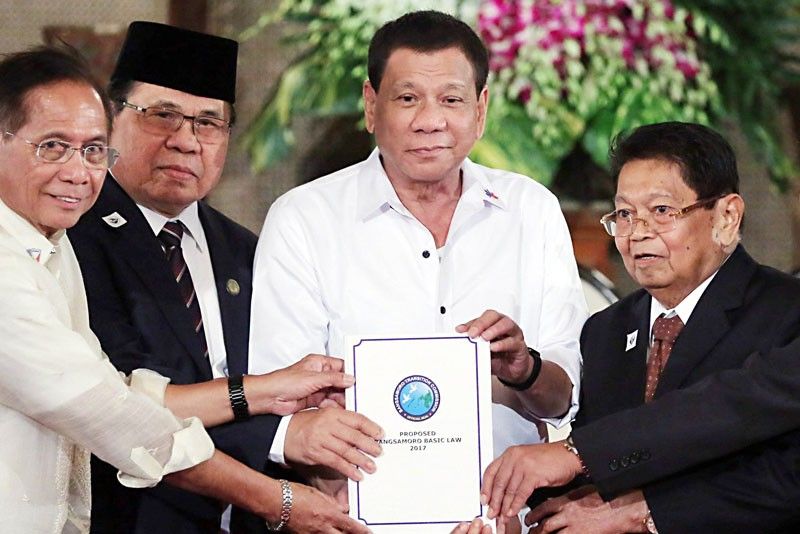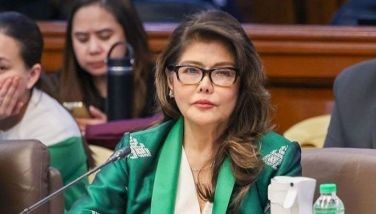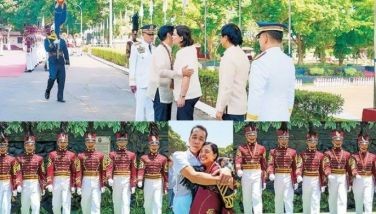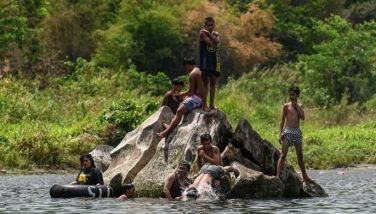Palace on BBL: Let’s find common ground

Senate votes 21-0 for Bangsamoro law
MANILA, Philippines — Malacañang yesterday hailed Congress for passing the Bangsamoro Basic Law (BBL) and expressed hope that the final version of the measure would withstand legal scrutiny and enable all sectors to find common ground.
Presidential spokesman Harry Roque said President Duterte has asked lawmakers and the Moro Islamic Liberation Front (MILF) to find common ground and come up with a version of the BBL that is acceptable to all.
Roque said Duterte asked all key players during a meeting at Malacañang “to work together” for the passage of the BBL.
“I know that they have respective versions that each sector is pushing, but we need a version that is acceptable to all and will withstand the test of judicial scrutiny. Otherwise we won’t have a BBL,” Roque said.
“It’s really a process of give and take.”
Roque said Duterte, who served as mediator between lawmakers and the MILF during the meeting, had insisted that the Bangsamoro entity cannot have its own military and police.
“It seems that the President was able to convince that it is not possible because that is his bare minimum,” he added.
Roque lauded the lawmakers for agreeing to reconcile their respective BBL drafts during the break.
“We are pleased that both houses passed the respective versions of the BBL. The certification was a signal that the President considers BBL as absolutely indispensable in the search for peace in Mindanao,” Roque said at a press briefing yesterday.
Voting 21-0, the Senate approved shortly after midnight the proposed BBL, which seeks to create a new autonomous region in Mindanao.
The approval on second reading, then third and final reading, came nearly nine hours after the House of Representatives, voting 227-11 with two abstentions, passed the landmark measure, which Duterte certified as urgent.
Since Tuesday, senators wrote at least 150 amendments in the 109-page BBL, which lawmakers rushed to approve before Congress adjourned its second regular session.
Among the contentious provisions were those on territorial boundaries of the proposed Bangsamoro autonomous region, annual block grants and its police and security powers that senators saw as violating the Constitution.
Senate President Pro Tempore Ralph Recto and Senate Minority Leader Franklin Drilon led their colleagues in putting in amendments. Other senators who put in amendments included Loren Legarda, Grace Poe, Cynthia Villar, Francis Escudero, Richard Gordon, Gregorio Honasan, Panfilo Lacson and Joel Villanueva.
Sen. Juan Miguel Zubiri, principal sponsor of the BBL, welcomed the numerous amendments, saying it would help avert the measure being questioned before the Supreme Court on constitutional grounds.
Sen. Aquilino Pimentel III also aired his confidence that the Senate version of the BBL would pass the test of constitutionality.
“Once we approved the BBL (Wednesday) night on third reading, we were all convinced about its constitutionality. We will survive the test of constitutionality,” Pimentel said.
Speaker Pantaleon Alvarez, for his part, said they would leave it to critics to file a petition before the Supreme Court questioning the constitutionality of the BBL.
“We (congressmen) believe what we are doing here is constitutional. But nobody can stop anyone from filing or questioning the constitutionality of a law,” Alvarez said.
“Let the SC decide on this matter,” he said, anticipating legal challenges the BBL will face, especially since this will eventually abolish the ARMM that is specified in the Charter.
More amendments
The House on Tuesday night approved its version of the BBL abolishing the ARMM that will allow for the establishment of the Autonomous Region of the Bangsamoro (ARB).
After the passage of their respective versions, the Senate and the House will form a bicameral conference committee to reconcile the conflicting provisions of the BBL and come up with a final version.
The final version is supposed to be ratified by both chambers on the first day of the Third Regular Session of Congress in the morning of July 23.
Duterte is expected to announce his signing of the BBL during his State of the Nation Address that afternoon.
Many of the amendments were on emphasizing the supremacy of the Constitution and keeping the powers of the national government intact.
Mohagher Iqbal, a member of the MILF central committee and the BTC, said he has mixed feelings over how the Senate version turned out, with its numerous amendments but admitted “the basic and substantial aspect of the agreement is still there.”
Iqbal was referring to the 2014 Comprehensive Agreement on the Bangsamoro (CAB) or final peace agreement between the government and the MILF.
He said he remains hopeful the final version that will come out of the bicameral conference committee will “see the best of the House and the best of the Senate.”
Among the amendments in the Senate version were on the protection of territorial integrity of the Republic of the Philippines – a clause that reiterates that the Bangsamoro is and shall remain part of the territory of the Republic; reduction of the block grant from six percent of net internal revenue to five percent and reduction of the Special Development Fund from P100 billion to P50 billion.
Recto also set a one-time plebiscite for joining the Bangsamoro autonomous region, instead of three plebiscites done every five years so there will be “no creeping expansion.”
Pimentel added that once the BBL is approved by Congress, a plebiscite would be held within 90 to 120 days by the Commission on Elections in the five provinces of the ARMM, six municipalities of Lanao del Norte and 39 barangays of Cotabato, Isabela and some adjacent local government units.
If the result of the plebiscite is in favor of the BBL, then the law is ratified and an Autonomous Region of Bangsamoro would be created.
In case the vote is against the BBL, then Pimentel said there would be a status quo and the ARMM would remain.
Lacson strengthened provisions in the BBL where the Bangsamoro police will be under the Philippine National Police in keeping with the constitutional precept that there should be one police force.
Drilon introduced several amendments to make sure the measure will not suffer the same fate as the controversial Memorandum of Agreement on Ancestral Domain (MOA-AD), which the SC declared unconstitutional.
Drilon said he expects that the BBL will be elevated to the SC once enacted into law.
Among the key amendments Drilon introduced “in order to strengthen the law’s adherence to Constitution” is to delete the provision on “reserved powers” for the new Bangsamoro autonomous region, given the Constitution already provides for the residual powers of the national government vis-a-vis autonomous regions.
“We did away with nomenclatures, used no specific name and simply mirrored the wording of the Constitution, and gave powers to the Bangsamoro government in keeping with the constitutional provisions on local autonomy,” he said.
Drilon noted it was particularly the wording of the MOA-AD which led the SC to declare it as unconstitutional, since its provisions vested the proposed Bangsamoro entity the status of an associated state not recognized by the present Constitution.
He moved for the inclusion of the provision reiterating “that the Bangsamoro people are citizens of the Republic of the Philippines.”
The BTC opposed the amendment, which puzzled Drilon, saying his proposal only reiterates the wording of the Constitution on Philippine citizenship.
“This was introduced to prevent any misinterpretation that there is a ‘Bangsamoro citizenship’ because we are all Filipinos and we are all citizens of the Philippines,” he said.
The Senate also carried Drilon’s amendment to remove the province of Palawan from the list of areas considered as historically part of Bangsamoro territory.
Separate flag and anthem
Buhay party-list Rep. Lito Atienza said some of the provisions in the BBL are unconstitutional and would create more uncertainties rather than promoting peace.
Atienza cited the provision that would empower the envisioned new Bangsamoro region to have its own flag and anthem.
“Our country has only one national flag and one national anthem. Why, then, is there a provision for a separate flag and anthem for the Bangsamoro? If it is a hymn like the ones used by different local government units, then the proposed law should distinctly state hymn instead of anthem. Having different flags and anthems will definitely not promote unity and peace in our country,” he said.
He said there is also a provision in the House version that would allow the Bangsamoro region to have its own police force.
Atienza urged the bicameral conference committee on the BBL to rid the proposed law of its unconstitutional provisions.
“The BBL should help in uniting the nation rather than dividing it,” he said.
Zamboanga City Rep. Celso Lobregat, among the critics of the BBL in the House, surprisingly did not vote on the measure.
He explained his abstention, saying the approved version of the BBL already addressed most of the contentious issues and concerns of his constituents as well as other stakeholders in Mindanao.
Lobregat agreed with the amendment of holding a single plebiscite, instead of the original proposal of six plebiscites, which he described as a “creeping expansion” of Bangsamoro territory.
According to Lobregat, the approved substitute bill says a barangay cannot join without the expressed approval of the entire city. The original version says a barangay can petition to join Bangsamoro only through 10 percent vote of its residents to be part of the Muslim region.
Zamboanga had strongly protested the provision, as this will disintegrate the city and other places opposed to being part of the Bangsamoro region, Lobregat said. – Paolo Romero, Delon Porcalla, Marvin Sy, Jess Diaz, John Unson, Roel Pareño
- Latest
- Trending



























